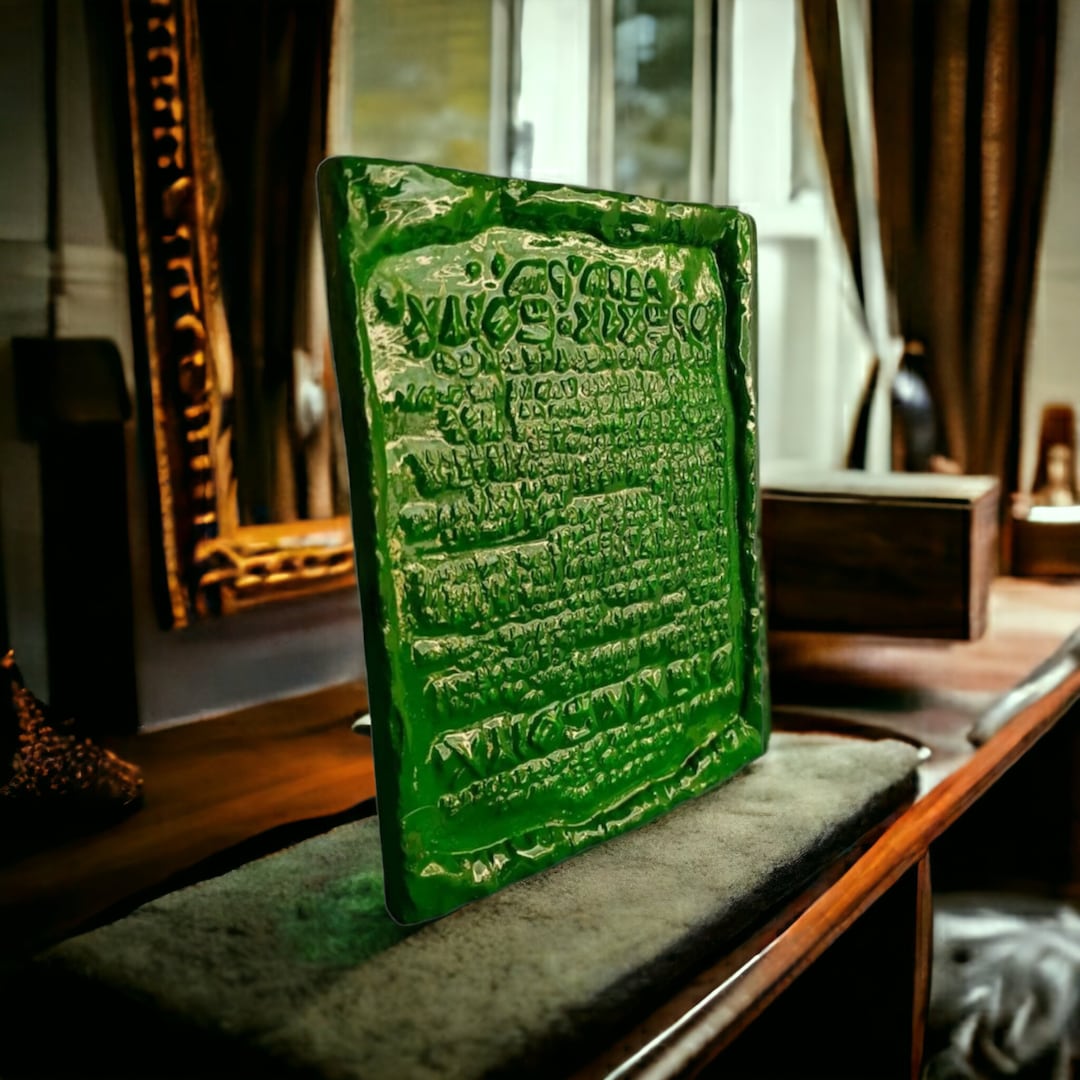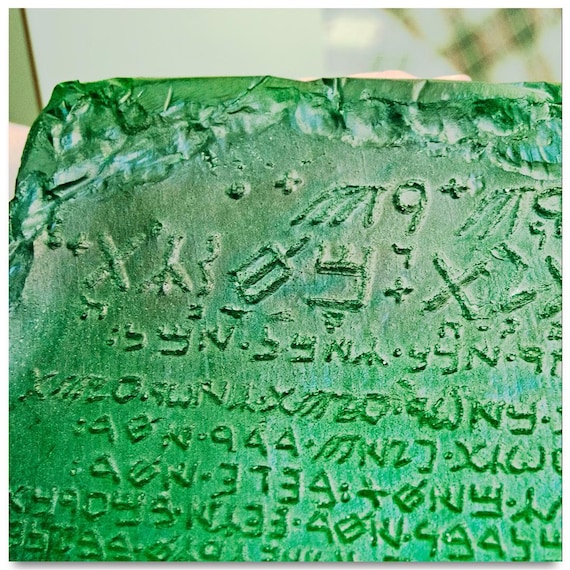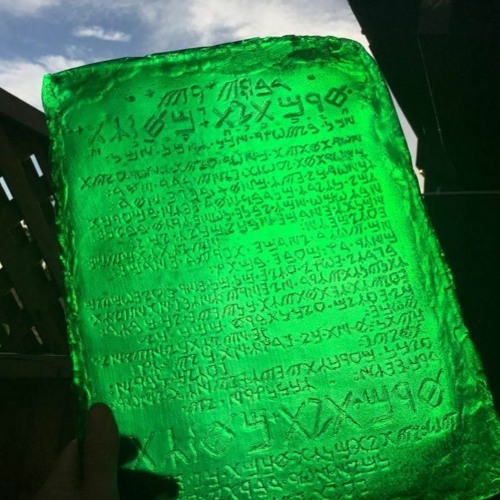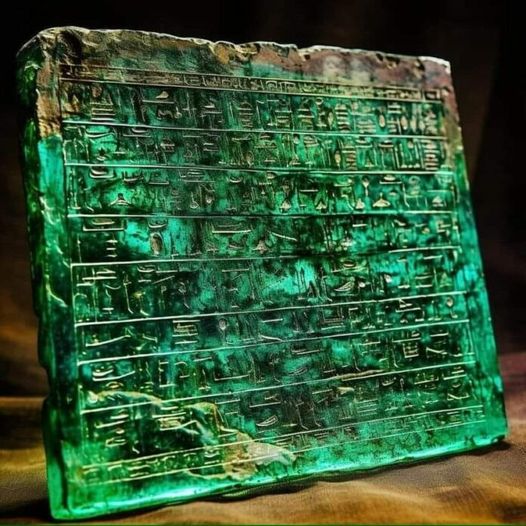The origins of Western alchemy can be traced back to Hellenistic Egypt, specifically the ancient city of Alexandria. At the heart of this esoteric tradition lies a revered figure known as Hermes Trismegistus, also called “Hermes the Thrice-Great.” Hermes is believed to have written the foundational texts of Western alchemical philosophy and practice, including the enigmatic Hermetica. But among his most legendary works is the Emerald Tablet, a tablet said to be inscribed with the very secrets of the universe.
The Emerald Tablet has captivated the imaginations of alchemists, philosophers, and seekers of hidden knowledge for centuries. Its origins are shrouded in mystery, with legends suggesting it was discovered in the tomb of Hermes Trismegistus himself or even originated from the lost city of Atlantis. Despite the uncertainty surrounding its provenance, the Emerald Tablet has exerted a profound influence on the course of Western alchemy, inspiring countless interpretations and commentaries from some of history’s most renowned thinkers.
In this blog post, we’ll delve into the fascinating legends and enduring legacy of the Emerald Tablet, exploring its impact on the alchemical tradition and its continued relevance in the modern era. Join us as we unravel the mysteries of this iconic artifact and discover the timeless wisdom it holds.
The Origins of the Emerald Tablet

The Emerald Tablet is said to be made of emerald or green stone and to contain the fundamental principles of the universe. Its origin is surrounded by a tapestry of legends and stories that have captivated the imagination of alchemists and esoteric scholars for centuries.
One of the most widely known legends suggests that the Emerald Tablet was discovered in the tomb of Hermes Trismegistus, the legendary figure believed to be the author of the Hermetica. According to this account, the tablet was found beneath the statue of Hermes in the ancient city of Tyana, held in the grasp of Hermes Trismegistus’ own corpse.
Another intriguing legend associates the Emerald Tablet with the Egyptian god Thoth, who is often identified with Hermes Trismegistus. The story goes that Thoth divided his vast knowledge into 42 emerald plates, which he then hid away after the fall of the gods. Only Thoth himself was said to be able to recover these tablets upon his return.
Some even claim that the Emerald Tablet has an even more ancient origin, tracing its roots back to the mythical lost city of Atlantis. This theory suggests that the tablet was a relic from the advanced civilization that was said to have existed in the Atlantic Ocean before its mysterious demise.
Despite the captivating nature of these legends, there is no conclusive historical evidence to support any of these claims about the Emerald Tablet’s origins. The oldest known source of the tablet’s text is the Kitab sirr al-haliqi, an Arabic work attributed to “Balinas” or Pseudo-Apollonius of Tyana, who claimed to have discovered the tablet in a tomb. However, the original document mentioned by Balinas no longer exists, having been lost, possibly during the burning of the Library of Alexandria.
The Emergence and Spread of the Emerald Tablet
While the origins of the Emerald Tablet remain shrouded in mystery, its influence on the alchemical tradition is undeniable. The oldest known version of the text is the Arabic work attributed to Balinas, which was written in the 8th century AD. This text, known as the Kitab sirr al-haliqi, or “Book of the Secret of Creation,” became the foundation for the Emerald Tablet’s widespread dissemination throughout the medieval and Renaissance periods.
Balinas’ account of discovering the Emerald Tablet in a tomb sparked a
wave of interest and curiosity among alchemists and scholars. Over the centuries, the text was translated into various languages, including Latin, Greek, and Hebrew, further expanding its reach and influence.

One of the most significant figures in the Emerald Tablet’s history was the 13th-century philosopher and alchemist, Roger Bacon. Bacon’s commentary on the Emerald Tablet, titled “Speculum Alchemiae,” played a crucial role in establishing the tablet’s status as a foundational text of Western alchemy.
Other notable scholars and alchemists who delved into the mysteries of the Emerald Tablet include the likes of Albertus Magnus, John Dee, and the infamous Aleister Crowley. Each of these individuals contributed their own unique interpretations and commentaries, further solidifying the tablet’s place as a cornerstone of alchemical thought and practice.
The Emerald Tablet’s influence extended far beyond the realms of alchemy, as it also captivated the interest of renowned figures such as the renowned scientist Isaac Newton. Newton’s fascination with the tablet’s esoteric symbolism and its potential to unlock the secrets of the universe is a testament to the enduring appeal and mystique of this legendary artifact.
The Emerald Tablet’s Enduring Influence
The Emerald Tablet’s influence on Western alchemy cannot be overstated. It has served as a foundational text, providing alchemists with a framework for understanding the fundamental principles of the natural world and the transformative processes at the heart of their practice.
One of the key interpretations of the Emerald Tablet suggests that its text describes the seven stages of alchemical transformation, known as the “Magnum Opus” or the Great Work. These stages, which include purification, dissolution, separation, conjunction, fermentation, distillation, and coagulation, have been the subject of countless commentaries and meditations by alchemists throughout history.

The Emerald Tablet’s esoteric language and symbolism have also made it a source of fascination for a wide range of thinkers and researchers. Its enigmatic nature has invited diverse interpretations, with scholars and philosophers seeking to uncover the hidden truths and universal principles encoded within its cryptic verses.
In recent years, the Emerald Tablet has even found its way into popular culture, with its presence felt in the surreal German-language series “Dark.” The show’s exploration of the tablet’s mysterious origins and its connection to the show’s overarching narrative has sparked renewed interest in this ancient alchemical text.
Despite the numerous interpretations and commentaries that have been written about the Emerald Tablet, its true meaning remains elusive. The tablet’s esoteric nature and the lack of a definitive original text have contributed to this enduring mystery, leaving readers and researchers to embark on their own journeys of discovery and personal interpretation.
Conclusion
The Emerald Tablet, believed to have been written by the legendary Hermes Trismegistus, is a testament to the enduring fascination with the secrets of the universe. Its origins are shrouded in mystery, with captivating legends suggesting it was discovered in the tomb of Hermes Trismegistus himself or even originated from the lost city of Atlantis.
While the true provenance of the Emerald Tablet may never be fully known, its influence on the alchemical tradition and Western esoteric thought is undeniable. The tablet’s enigmatic text has inspired countless interpretations and commentaries from some of history’s most renowned thinkers, each seeking to uncover the hidden truths and universal principles it contains.
As we continue to explore the mysteries of the Emerald Tablet, we are invited to embark on our own personal journeys of discovery. Whether you are a seeker of alchemical wisdom, a student of esoteric traditions, or simply someone captivated by the enduring allure of the unknown, the Emerald Tablet offers a timeless invitation to delve into the secrets of the cosmos and uncover the profound insights that lie within.
